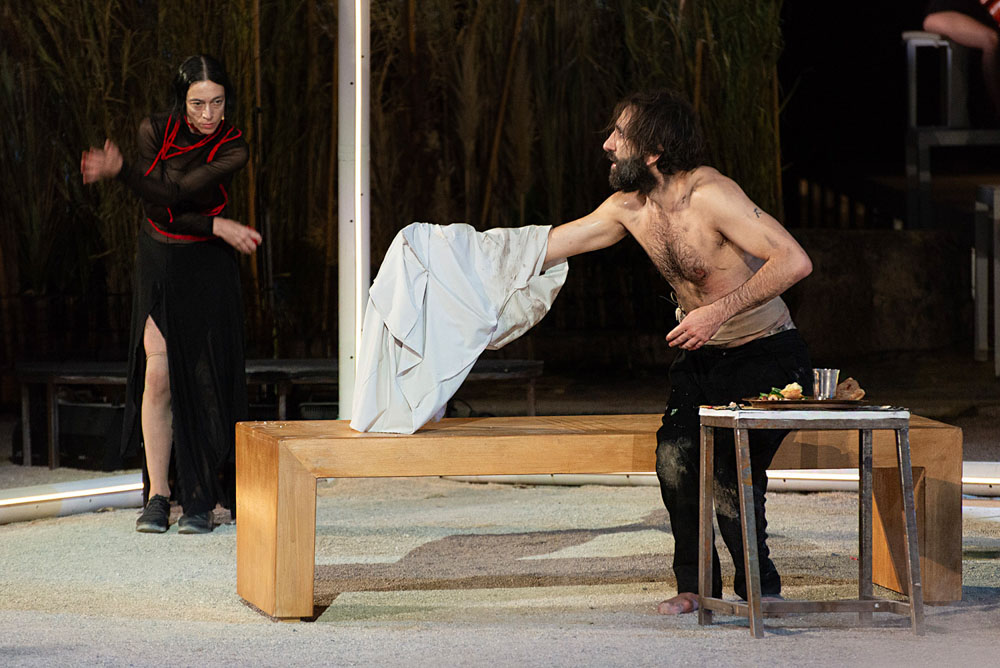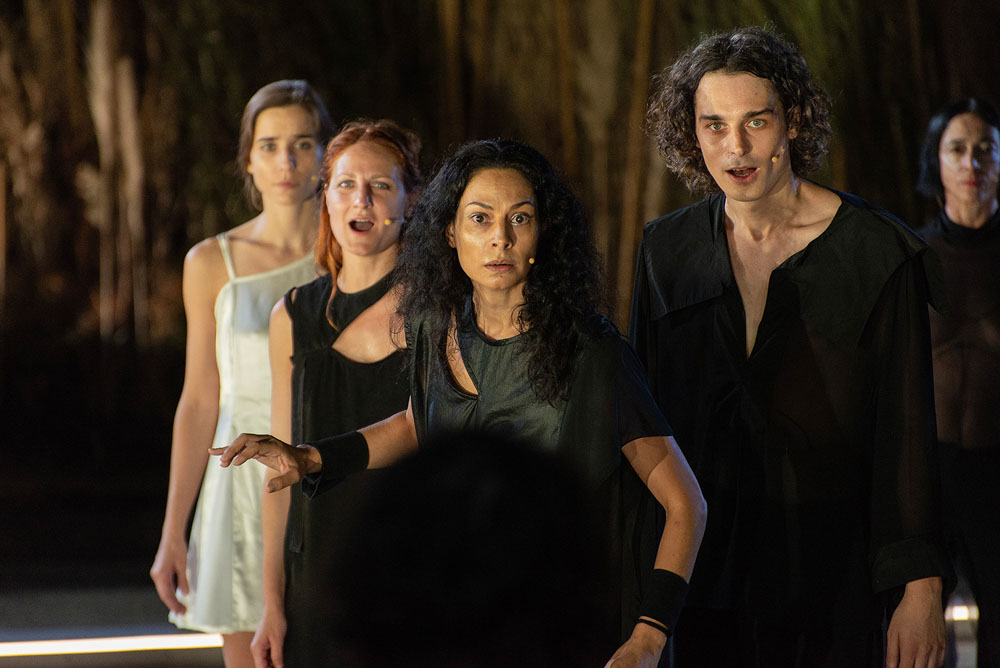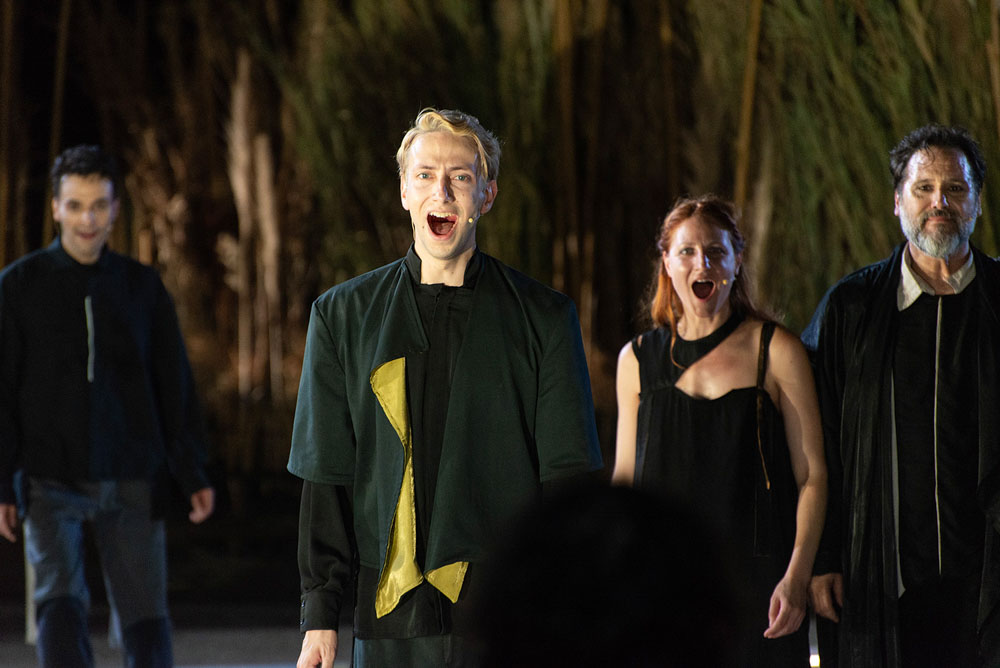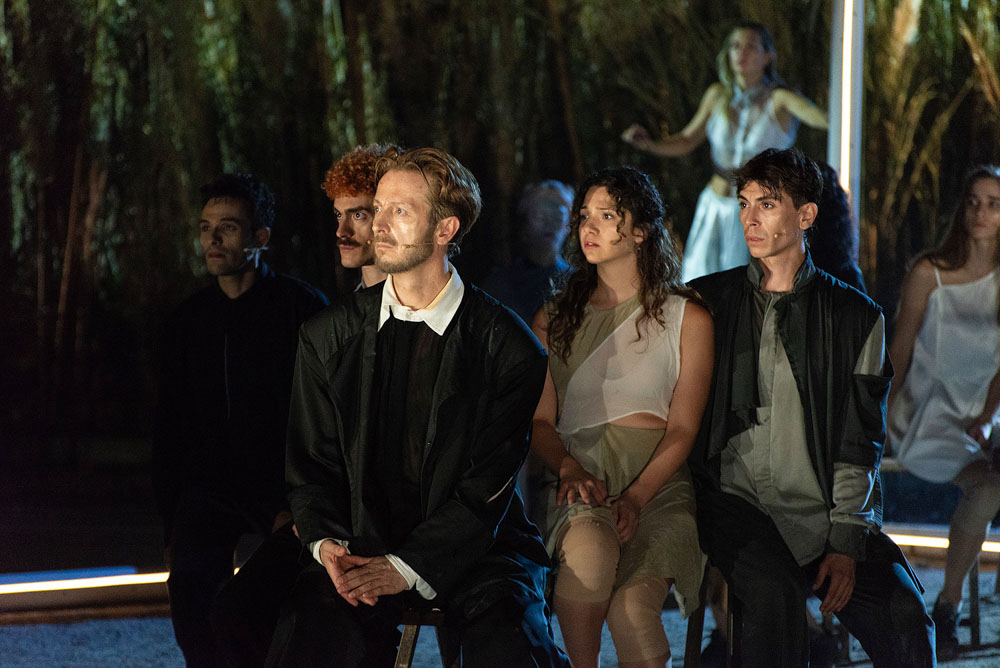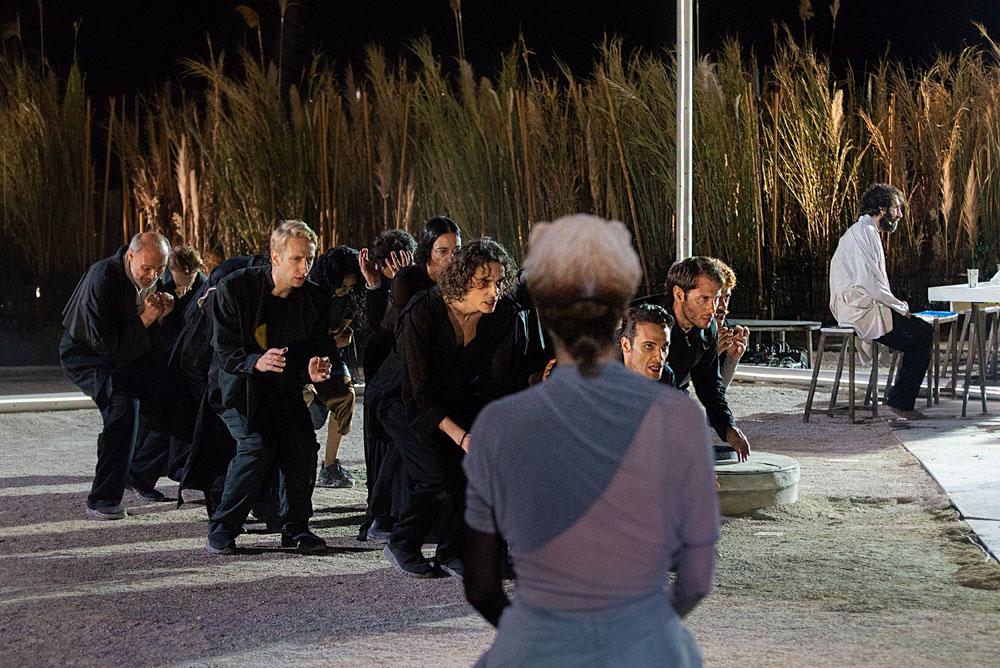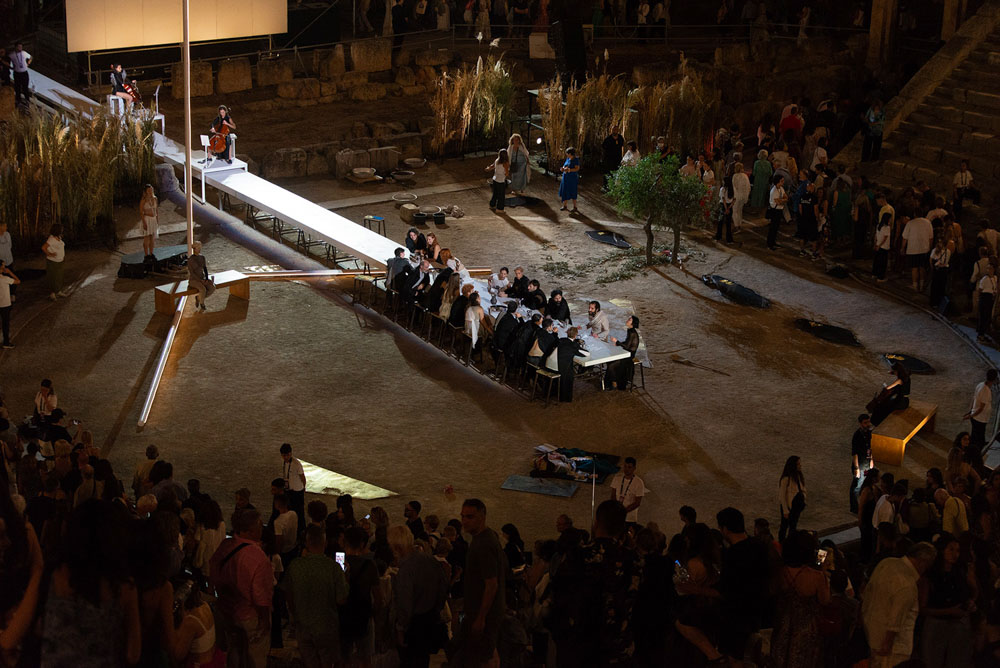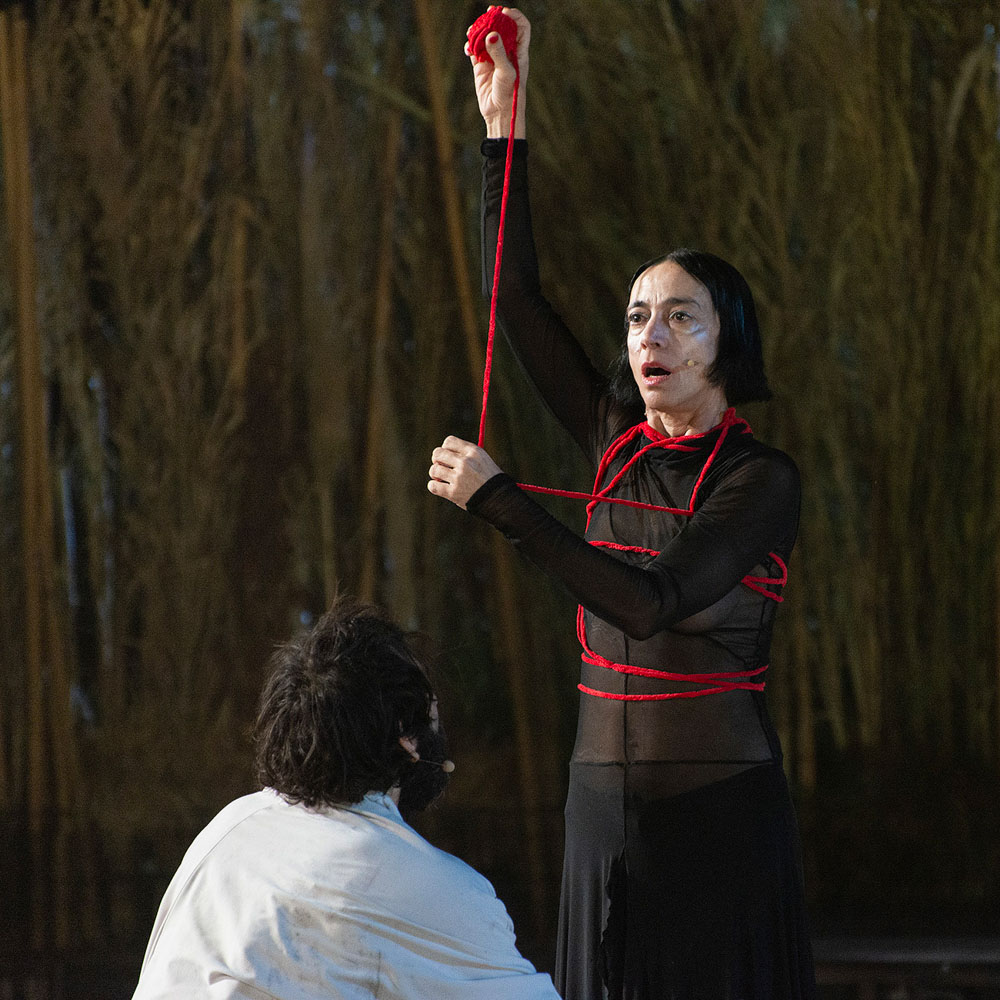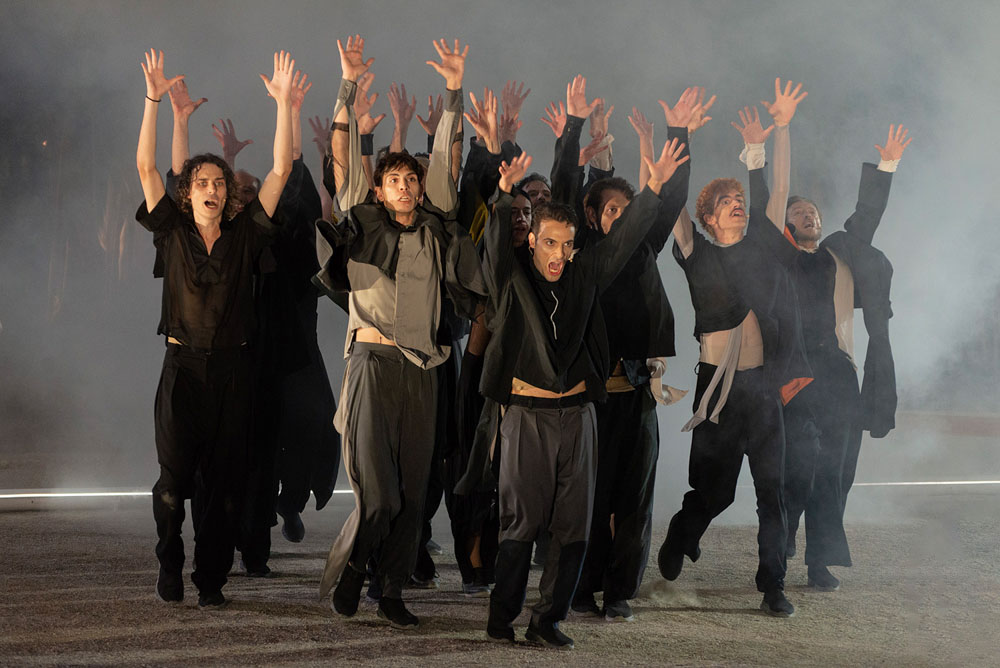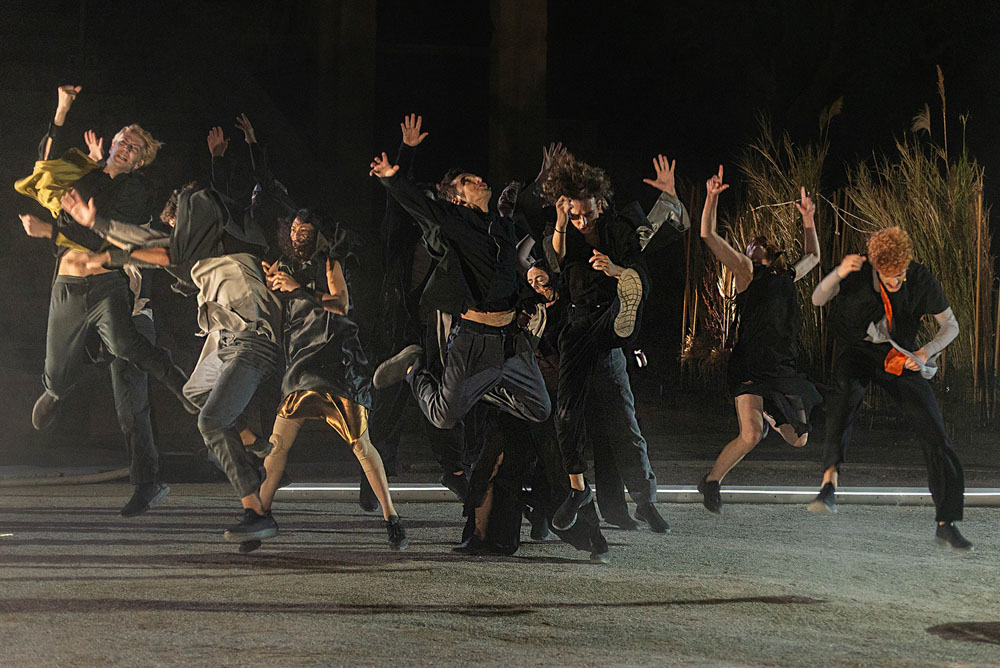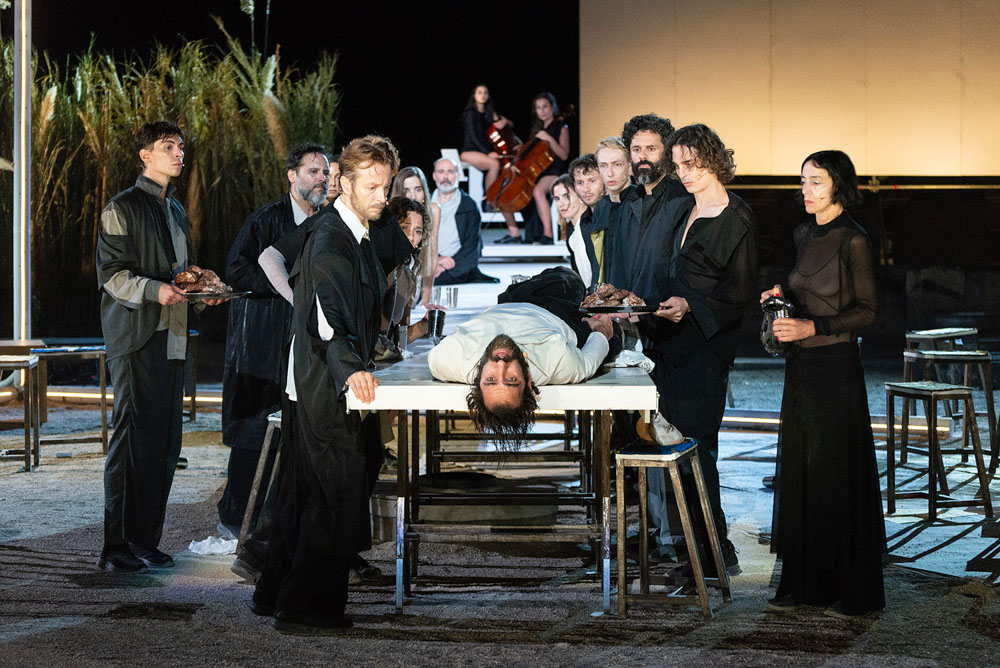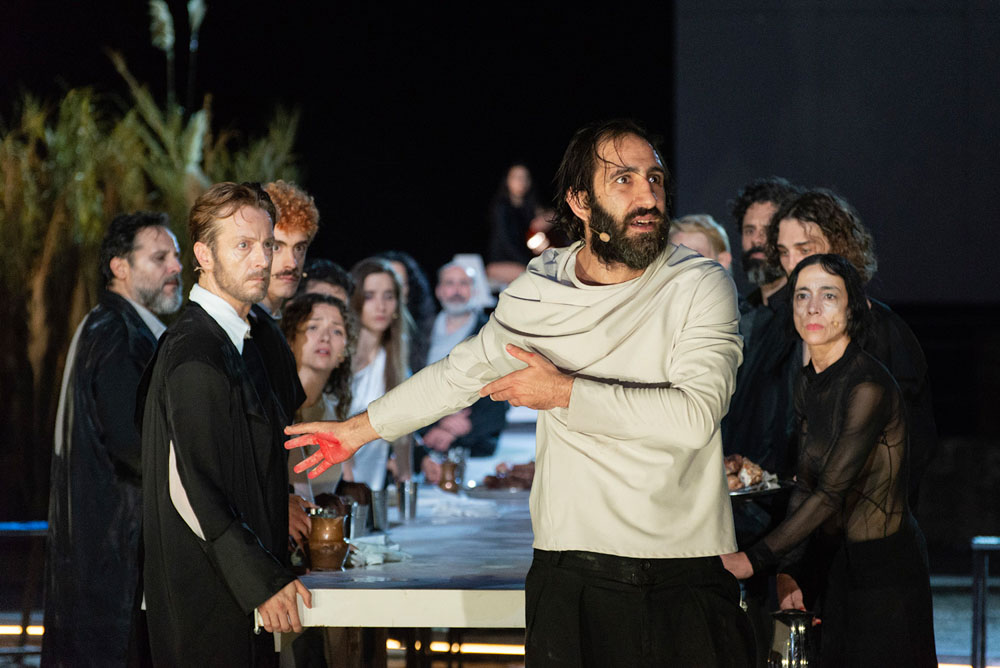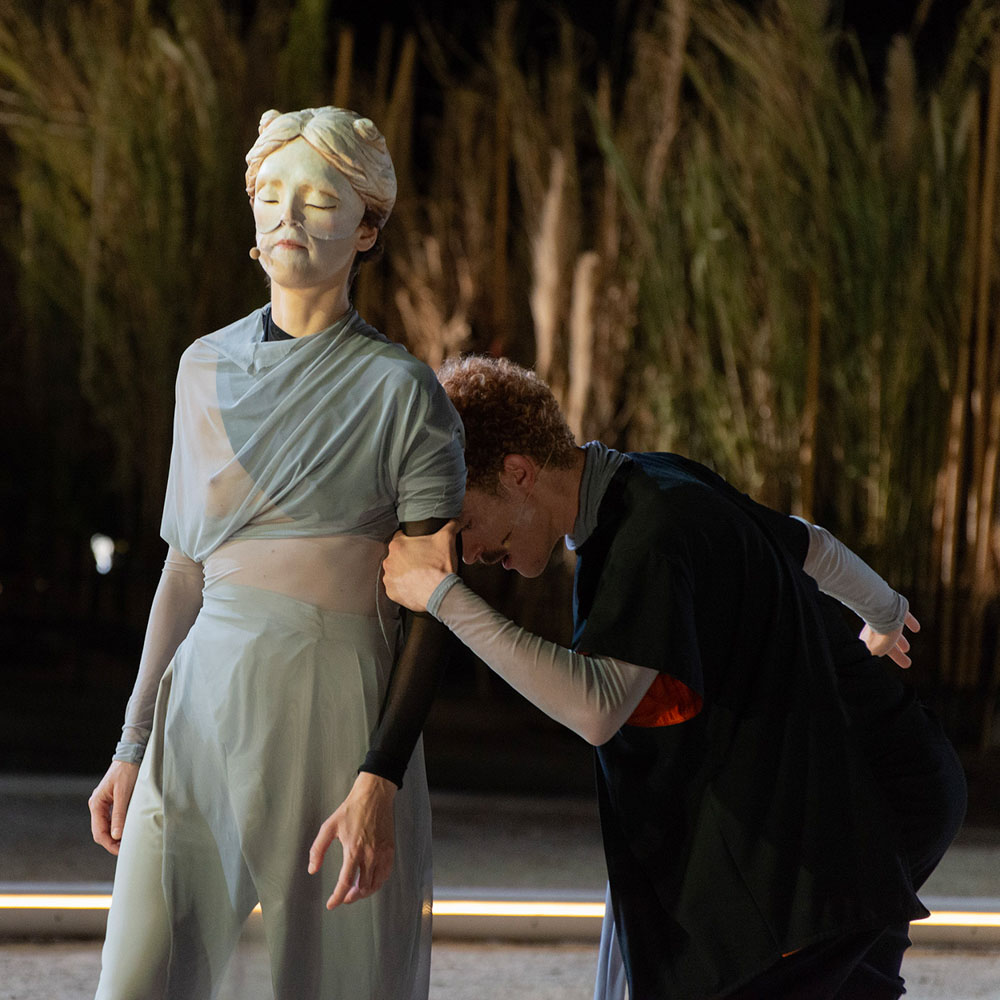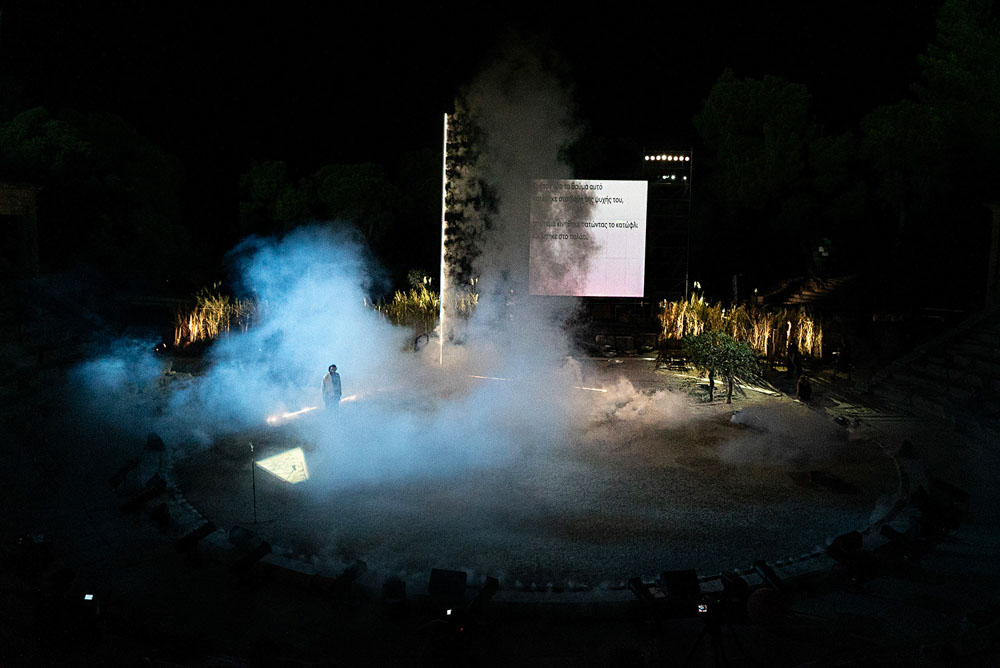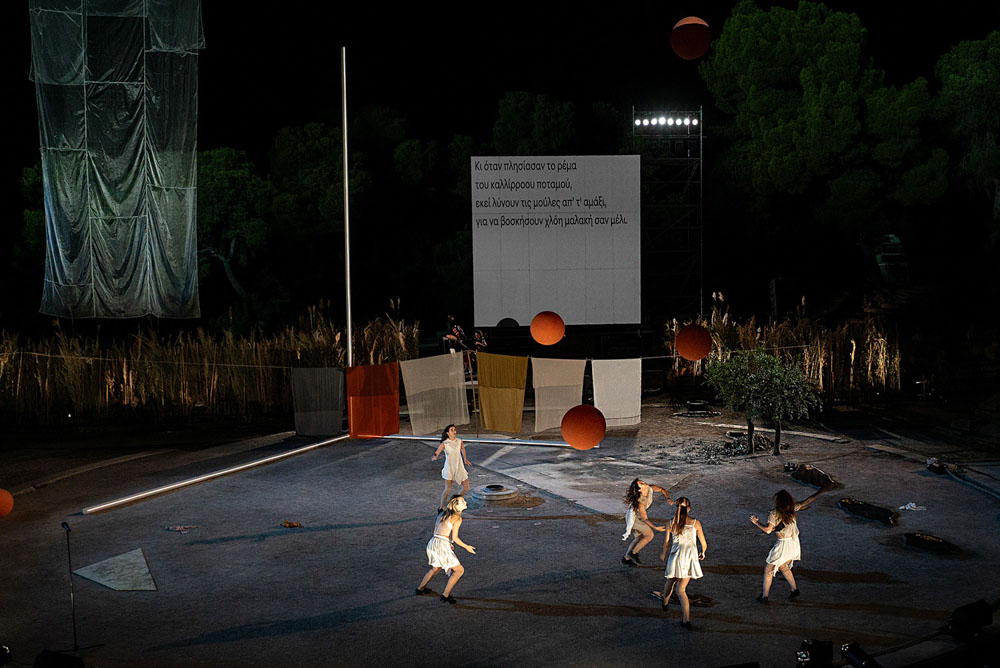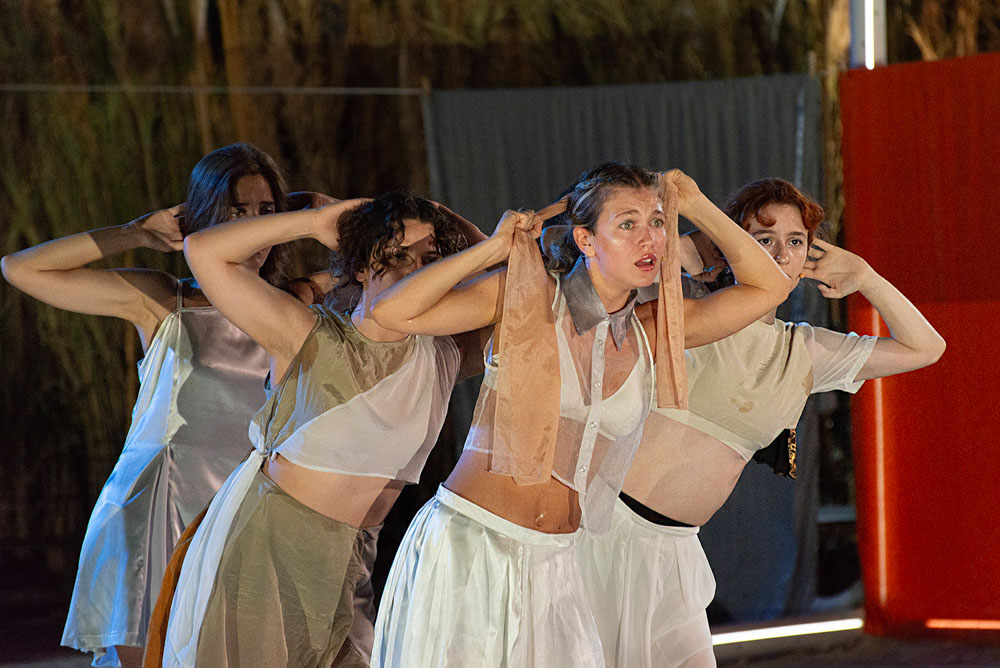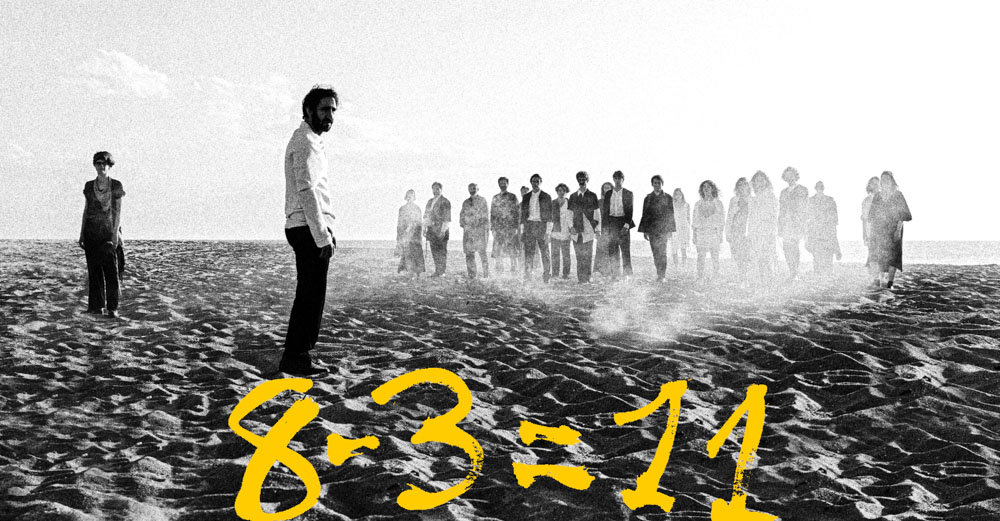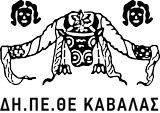|Translation: Dimitris Maronitis|
|Direction: Michail Marmarinos|
|Saturday 9 August, 21:00|
|Ancient Theatre of Philippi|
Co-production: NTNG – THOC
Following its great success at Epidaurus and its performances in Cyprus, the production “ζ – η – θ / The Stranger” – A return to the sources: Visiting three rhapsodies of the Odyssey, translated by Dimitris Maronitis and directed by Michail Marmarinos, continues its journey through selected festivals across Greece. The co-production between the National Theatre of Northern Greece and the Cyprus Theatre Organisation will be presented on Saturday 9 August at the Ancient Theatre of Philippi, as part of the 68th Philippi Festival.
Michail Marmarinos returns with yet another unexpected dramaturgical proposal, leading a return to the sources. A visit to three rhapsodies of the epic reveals how this unending mystery of oral narration (the deep mystery of theatre itself) possesses the power to launch us “to where history is still taking place”.
This performance—a poetic theatrical landscape transcending eras—offers a contemporary stage reading of the epic that confronts us with the idea of the stranger, in whose difficult position we may all one day find ourselves. It poses timeless questions:
Who is the stranger, and who are We?
An existential wandering of the stranger through three rhapsodies.
My noble Alcinous, first among your people,
indeed, it is a fine thing to hear a good bard,
And I admit, there’s no delight more charming
than when all the world joins in joy: guests
seated in a hall, listening intently to a singer,
while tables before them are filled with bread and meat,
and the wine-pourer draws from the mixing bowl
and serves cups around.
That, I feel, is the finest thing of all.
Homer’s Odyssey, Rhapsody i, lines 2–11, trans. D. N. Maronitis,
Institute of Modern Greek Studies (Manolis Triantafyllidis Foundation), Aristotle University of Thessaloniki, 2006
*The additional excerpts from the Iliad used in the production’s dramaturgy are also translated by D. N. Maronitis (Agra, 2012), while the excerpts from Virgil’s Aeneid are drawn from Theodoros Papangelis’ translation (National Bank of Greece Cultural Foundation, 2018).
Fragments from Quintus Smyrnaeus’ Posthomerica are also included, translated specifically for the performance by Giannis Doukas.
DIRECTOR’S NOTE
A FEW WORDS ABOUT THE BRONZE AGE
“Everything that lives within the folds of the Epic has form, a personal substance: horses speak and prophesy, rivers respond as animate entities, coincidence implies a divine hand.
If for modern sensibility, Dawn is a natural phenomenon, for Homer she is a personified event. Thus, we see her rising from her bed…
[…]
Here, man has not yet suffered the inner fracture that splits his being into mortal and immortal, rational and irrational. He lives and acts as an undivided whole, a psychosomatic unity (unprecedented and unsurpassed in Western civilisation), without internal division.”
*Kostis Papagiorgis, “The Homeric Battle”, Kastaniotis Editions, Athens 1993, pp. 20–23
Truly, what do we remember from the epic?
To what extent could that Bronze Age — its returns and spirituality, its rawness and its ethos — ideally enter into dialogue with, infuse some kind of light into, our present shadows?
To what extent might that civilisation of Aidos, its relationship with Nature, with god, the divine and the miraculous, its relationship with the stranger — or with that deep mystery of hospitality — have something to say today, to our own civilisation? To our own present questions?
After NEKYIA—that visit to Rhapsody λ in collaboration with Japan’s Noh Theatre, which premiered in Tokyo and was later staged for the first time at the ancient theatre of Epidaurus—now comes another return to the sources…
A visit to three rhapsodies of the epic, and how this unending mystery of oral narration (the deep mystery of theatre) can launch us, thrillingly, “to where history is still taking place”.
A stranger—and Oios, as Homer calls him, meaning “alone”—a wreck of a man, shattered after his final shipwreck and his battle with the sea, is washed ashore…
(Does this image perhaps remind us of anything today? Has it not—however fleetingly—entered our field of vision in the modern world around us?)
Here, on a foreign shore he did not choose, he is tasked with recovering his body, his face, his name.
For 1,263 verses he remains unknown, nameless, a stranger, and only after his first tear—and then his anguished weeping— begins a path toward “recognition”.
In their attempt to honour him (as the divine is always hinted at in a stranger), to ease his pain with songs of heroes and gods, they do not realise they are singing his life… And when, through the dignity of tears, he asks that they allow him — a stranger — to continue the story himself, entering now, a dramatic figure / an image, into the theatre of his life, “recognition” will not be long in coming.
Thanks to a dramaturgical intrigue of rare genius by the poet of the Odyssey (almost unique in the global repertoire), his tears turn him into an audience, a narrator, a rhapsode, a poet of his own life. Alongside “recognition”, he reclaims his name…
[There is a simple, fundamental, vital desire that defines human life: to journey from point A to point B. As odyssey—whether of external or internal geography (and how many internal odysseys there are for mortals) – could be described every unplanned complication or adventure of this path, defined by unintentional, undesired, and unforeseen detours. And it is hard to find a mortal who has not, even by analogy, found themselves in at least one place or condition in life that has marked them as a stranger.
Might sympathy – the kind theatre can offer us with generosity through the epic – function as a gentle touch, a gesture of understanding for the drama of the Other? For the difficult position of the stranger, where – as History so urgently teaches us – there is no guarantee that any one of us might not find ourselves in such a position at the next sudden turn of fate?]
The epic… the epic taught us how to breathe.
Michail Marmarinos
CREDITS
Translation: Dimitris Maronitis
Direction: Michail Marmarinos
Dramaturgy: Eleni Moleski – Michail Marmarinos
Set Design: Giorgos Sapountzis
Costume Design: Eleftheria Arapoglou
Music Composition: Andis Skordis
Choreography: Gloria Dorliguzzo
Lighting Design: Eleftheria Deko
Masks: Martha Foka
Assistant Director A: Eleni Moleski
Assistant Director B: Alexia Paramytha
Assistant Set Designer: Katerina Zyrpiadou
Assistant Costume Designer: Ernesta Chatzilemonidou
Assistant Choreographer: Stella Mastorosteriou
Lighting Assistants: Nasia Lazou, Sotiris Roumeliotis
Music Coach: Panagiotis Barlas
Production design coordination (NTNG): Danai Pana
Production Coordinator: Eva Koumandraki
Photography: Mike Rafail (That Long Black Cloud)
‘’ξεινοδόκοι και ξείνος’’
(“The Stranger and the Hospitable”)
Rhapsody 8(θ), line 543
The Stranger and Us
Stranger: Charis Fragkoulis
US / THE PHAEACIANS
Klelia Andriolatou: Nausicaa
Galateia Aggeli: Nymph, daughter of a Dymas, goddess Athena
Erato Maria Mandalenaki: Nymph, friend of Nausicaa
Christina Bakastathi: Nymph, friend of Nausicaa
Stella Papanikolaou: Nymph, friend of Nausicaa
Elektra Goniadou: goddess Athena, Phaeacian woman
Kleio Danai Othoneou: goddess Athena, Phaeacian woman
Elena Topalidou: Arete
Christos Papadimitriou: Alcinous
Giannis Charisis: Echenaeus, leader and advisor of the Phaeacians
Foteini Timotheou: Eurymedousa, Phaeacian woman
Nikos Kapelios: Leader and advisor of the Phaeacians, voice of Hephaestus
Giannis Varsos: Euryalus, young Phaeacian
Nikolas Grammatopoulos: Clytoneus, young Phaeacian
Nektarios Theodorou: Elatreus, leader and advisor of the Phaeacians
Kostis Kapellidis: Amphialus, goddess Athena, herald, Ares, young Phaeacian
Nikos Koukas: Laodamas, young Phaeacian
Titos Makrygiannis: Thoon, young Phaeacian
Giannis Tomazos: Alyos, young Phaeacian
Lenia Zafeiropoulou: Blind bard (Demodocus, Aphrodite)
Musicians on stage – cello: Evi Kazantzi, Alba Lymtsiouli, Aliki Marda
|ζ – η – θ / The Stranger|
|A return to the sources: Visiting three rhapsodies of the Odyssey|
|Saturday 9 August, 21:00|
|Ancient Theatre of Philippi|
Duration: 2 hours and 5 minutes
Online pre-sale and box office prices (until the day before): €17
General Admission: €20
Students / Over 65s: €14
Teachers / Group bookings (20 people): €11
Unemployed: Free entry (20 tickets per performance for the performances at the Forest Theatre), after that: €10
People with disabilities & companions: €8
20 Complimentary Admissions per performance for actors outside of NTNG and students of theatre studies; once these are used, ticket price: €8
Online presale:
https://www.more.com/gr-el/tickets/theater/z-i-th-o-ksenos-2/
Presale
Kavala: Municipality of Kavala Visitor Information Centre (former EOT), Central Square, tel: 2510-620566, daily from 10:00 to 14:00 and 18:00 to 21:00. On the day of the performance, tickets will be available at the Ancient Theatre of Philippi from 19:00.
Krinides: Café “Proskinio”, Ancient Theatre of Philippi, tel. 2510-516090
*No entry is allowed after the start of the performance.
**Once again this year, there will be a special KTEL Kavala bus transporting spectators to and from the Ancient Theatre of Philippi, upon presentation of a valid ticket for the performance. Return fare: €4.00.
Departure from KTEL Kavala: 18:45 – Return after the end of the performance.
Note: Holders of personalised invitations for the 68th Philippi Festival are requested to confirm their attendance by Thursday 7/8. Identity checks will be conducted at the theatre entrance on the day of the performance.
For more information, call the Municipal and Regional Theatre of Kavala at 2510 220876 (10.00 – 14.00).
